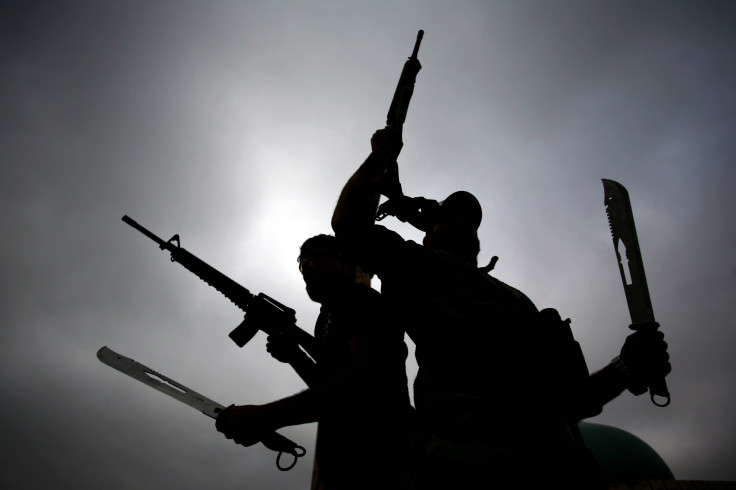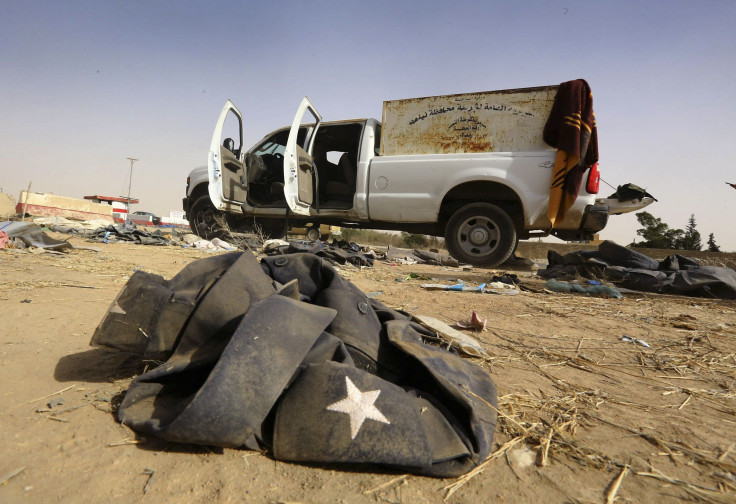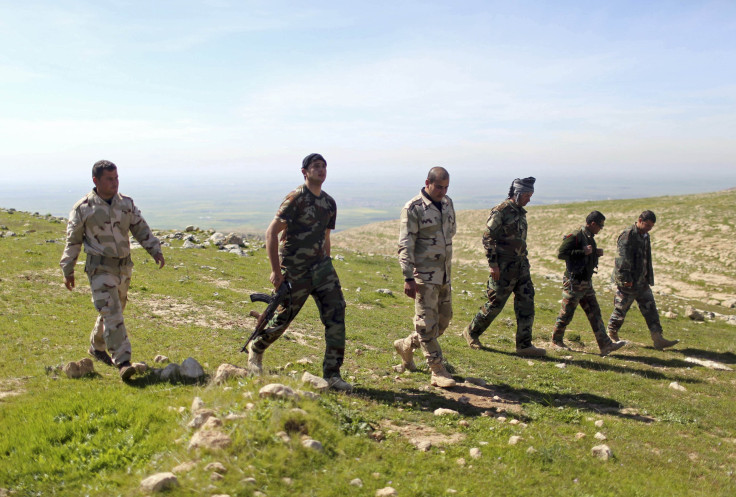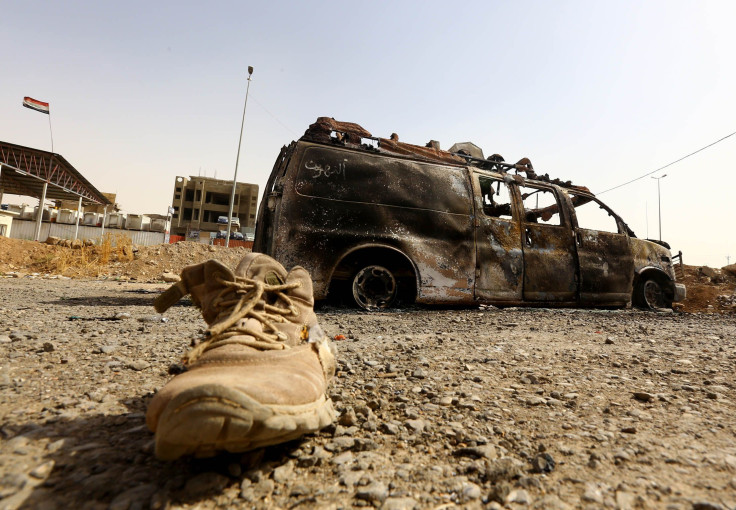ISIS One Year Later: US Strategy To Fight ISIS Is Not Working, Lacks Sunni Inclusion, Experts Say

The soldiers saw the Toyota pickup trucks roaring over the hills toward their posts on the outskirts of Mosul, Iraq’s second-largest city. The men, dressed in all black, got out of their vehicles, shooting their Kalashnikovs in the air, demanding the Iraqi soldiers abandon their posts. The soldiers obeyed. Stripping down to their underwear to avoid being detected via their uniforms, they fled -- because, they said in interviews with International Business Times, they felt no sense of loyalty to the government then led by Prime Minister Nouri al-Maliki.
Within hours, the entire city had fallen. All Iraqi soldiers had abandoned their posts in and near Mosul, leaving the city to an extremist group that would go on to gain worldwide infamy for its brutal rule and gruesome violence.

That was one year ago, June 10, 2014, when the world first took widespread notice of the Islamic State group, or ISIS. Moving out of Syria, the militants stormed into Iraq and, barely three weeks later, proceeded to declare a self-styled caliphate that has since expanded greatly.
Lack of loyalty to the central government was one of the major reasons the Islamic State group was able to take over so much land within a short period of time, experts say. Now, one year later, the group is still holding on to its territory and taking even bigger chunks of Iraq, for the same reason.
The soldiers who were supposed to defend Mosul that day last year were not the only ones who didn’t want to fight for their country. Sunni soldiers across Iraq, including those in the Kurdish militias with the semiautonomous Kurdish Regional Government, said during interviews in June 2014 that they were disenfranchised by the government of the Shiite Maliki. Some had not been paid for more than six months. Following the fall of dictator Saddam Hussein, a Sunni, a new government dominated by the majority Shiites set out to promote only fellow Shiites to top positions in the armed forces -- and to oppress the Sunnis, who had ruled Iraq for many decades with an even harder fist.

Political, ethnic and religious divisions in both Iraq and Syria have deepened further in the past year, and the U.S. and its allies, including the central Iraqi government, have not properly engaged, experts say, the one group needed to defeat the Sunni militant group: Sunnis themselves.
The Sunni problem is one of the main reasons that the U.S. and the coalition it leads have been unable to dislodge ISIS from its territory despite heavy bombing that began last year.
“Our objective is clear: We will degrade, and ultimately destroy, ISIL through a comprehensive and sustained counterterrorism strategy,” President Obama said in a speech in September, using an alternative acronym for the group.
But degrading and destroying ISIS can happen, experts say, only if the U.S. and its allies can engage Sunnis to help fight back against the militant group and to stop supporting it with cash and weapons, support that made a vital difference in the recent battle for Ramadi in western Iraq.
“In areas that are Sunni, ISIS does very well,” said Andrew Tabler, an expert on the ISIS at the Washington Institute for Near East Policy. “In other more mixed areas, it has a harder time. Without working with the Sunnis, we aren’t going to do anything substantial.”

The disengagement of Sunnis in Iraq and the general sense of frustration were on display last June, as Mosul fell to the advancing ISIS. “They just left because they did not want to fight ISIS. They would rather we did. ISIS might be able to beat Maliki, but they can’t beat us. Maliki’s soldiers fight for money, not for their country,” a Kurdish military official from Daquq in Iraqi Kurdistan said an interview then.
But the Kurdish militia could not hold back ISIS alone or without more help from Baghdad, including ammunition and heavy weaponry. That support never came. Within weeks, ISIS took over village after village and marched all the way to the outskirts of Baghdad, gaining Sunni supporters and new recruits along the way.
Now, despite a change in government in Baghdad to a more moderate, Shiite-dominated Cabinet led by Prime Minister Haider al Abadi, and a U.S. push to incorporate all regional parties to smooth tensions, the fractioning of religious, ethnic and political groups is at an all-time high, experts say. And a U.S. effort to recruit, train and equip Sunnis in both Iraq and Syria to take on ISIS is faltering.
In Syria, the U.S. initially fielded a CIA program to arm moderate rebels in the northern part of the country. But that program fell through when moderate groups, such as the then-well-known Harakat Hazzm brigade, folded into larger, more extremist organizations with links to Jabhat al-Nusra, the al Qaeda offshoot in the country.
Now, the U.S. Department of Defense is trying to launch a train-and-equip program in Turkey to complement one it already has in Jordan. But that program was delayed last month because of disagreements between the rebels and the U.S. about the real enemy in Syria. The rebels want to employ American weapons and training to fight Assad; the U.S. wants them to go after ISIS.
"The train-and-equip program in Syria isn't working because we don't have the politics right," Tabler said. "There are problems with recruitment and vetting."
The stalling of the U.S. program has given ISIS the space to grow in Syria, too, where last month it took key cities including Palmyra.
In major Syrian cities such as Aleppo, the rising power of ISIS is driving the other rebel groups to form partnerships with groups with different ideologies so as to have a chance of defeating the Sunni militant group while fighting regime forces.
Meanwhile in Iraq, following the fall of Ramadi last month, the Iraqi government and its American allies have -- for the first time since last year -- officially armed Sunni tribesmen through a targeted program. Sunni fighters, armed with American weapons and fresh from training by U.S. and Iraqi military advisers, are being deployed with the objective of pushing the ISIS militants out of Anbar province, the Sunni heartland of Iraq.
But even before the mission gets underway, the Sunni fighters confront substantial doubts about their effectiveness, say members of the Iraqi security forces responsible for training new classes of fighters. They are largely untested, and they will have to go up against well-trained, battle-hardened fighters without the Shiite militias that have been instrumental in whatever success Iraq has had in driving back ISIS.
The Shiite militiamen known as Hashd al Shabi, or Popular Mobilization Committees, played a key part in routing ISIS at the battle for Tikrit earlier this year. But they won’t lead the attack in Anbar. And despite the new train-and-equip programs and the thousands of U.S. and coalition airstrikes in Iraq and Syria, the militant group still holds sway. Just a few days ago, it showed what a strong pull it exerts on the loyalty of Iraqi Sunnis when some of the most important tribal leaders in Anbar pledged allegiance to the so-called caliphate.
And as the war in Iraq and Syria goes on, the message ISIS sends -- that it’s best-placed to protect Sunnis in the face of sectarian enmity -- is getting stronger.
"The trend is, the longer the war goes on, the more bloody and sectarian it becomes," Tabler said. "ISIS doesn't just spread militarily, it spreads politically. It recruits people."
© Copyright IBTimes 2024. All rights reserved.





















